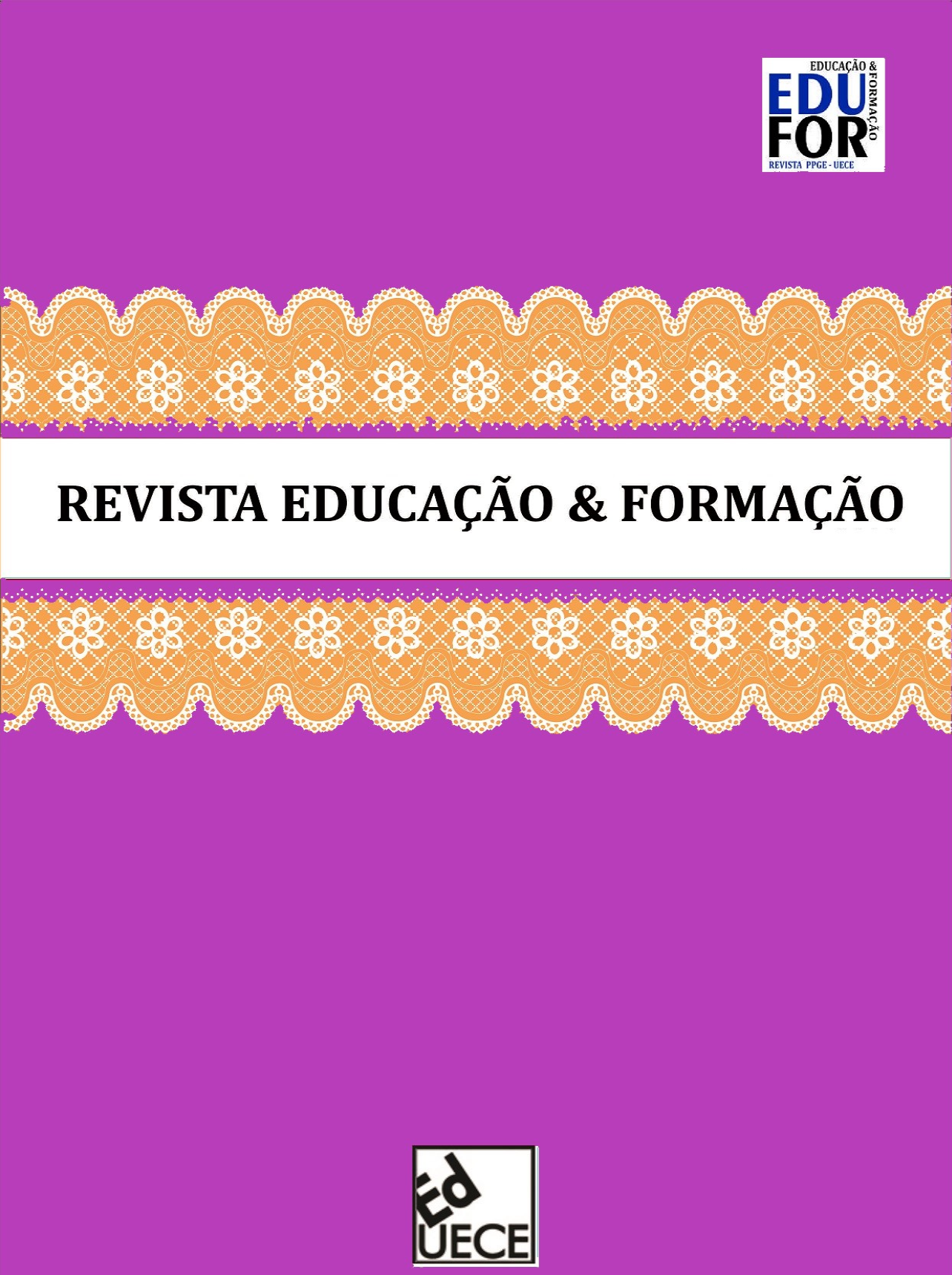Hábitos de leitura e competência lexical de futuros professores de inglês na Educação Primária
DOI:
https://doi.org/10.25053/redufor.v6i1.3504Palavras-chave:
Leitura, Vocabulário, Formação Inicial do Professor, Línguas Estrangeiras ModernasResumo
Objetiva-se refletir sobre a competência linguística e o desenvolvimento de hábitos de leitura no ensino superior, focando especificamente a análise da competência lexical de futuros professores primários de inglês e seus usos de leitura nessa língua estrangeira. Participaram da pesquisa 34 alunos do Itinerário de Intensificação de Inglês do Ensino Fundamental da Faculdade de Educação da Universidade de Extremadura. Esses alunos preencheram um questionário para determinar a extensão de seu vocabulário receptivo e um teste simples no qual relataram seus hábitos de leitura. A maioria dos alunos ainda não adquiriu o conhecimento do léxico das 3.000 palavras mais frequentes e também não estabeleceu um hábito de leitura em uma língua estrangeira. Por fim, na análise de correlação realizada, não foi observada relação entre frequência de leitura e tamanho do vocabulário.
Downloads
Referências
ADOLPHS, S.; SCHMITT, N. Vocabulary coverage according to spoken discourse context. In: BOGAARDS, P.; LAUFER, B. (ed.). Vocabulary in a second language. Amsterdam: John Benjamins, 2004. p. 39-49.
AGUSTÍN LLACH, M. P.; TERRAZAS GALLEGO, M. Examining the relationship between receptive vocabulary size and written skills of primary school learners. Atlantis, v. 31, n. 1, p. 129-147, 2009.
ALDERSON, J. C. Diagnosing foreign language proficiency: the interface between learning and assessment. London: Continuum, 2005.
BERTAUX, P. et al. The CLIL Teacher’s Competence Grid. 2010. Disponible en: http://tplusm.net/clil_competences_grid_31.12.09.pdf. Accedido el: 7 mar. 2018.
BLEICHENBACHER, L. et al. Teacher competences for languages in education: conclusions of the project. Graz/Strasbourg, 2016.
BOGAARDS, P. Le vocabulaire dans l’apprentissage des langues étrangères. Paris: Didier, 1994.
CANGA ALONSO, A. Receptive vocabulary size of secondary Spanish EFL learners. Revista de Lingüística y Lenguas Aplicadas, Valencia, v. 8, p. 66-75, 2013.
CANGA ALONSO, A.; FERNÁNDEZ FONTECHA, A. Motivation and L2 receptive vocabulary knowledge of Spanish EFL learners at the Official School of Languages. Miscelánea, Zaragoza, v. 49, p. 13-28, 2014.
COHEN, J. Statistical power analysis for the behavioral sciences. 2. ed. Hillsdale: Erlbaum, 1988.
FAN, M. How big is the gap and how to narrow it? An investigation into the active and passive vocabulary knowledge of L2 learners. RELC Journal, London, v. 31, n. 2, p. 105-119, 2000.
FRIGOLS, M. J. et al. European Framework for CLIL. Graz: The European Center for Modern Language, 2011.
GÓMEZ LÓPEZ, Á. Los hábitos lectores en inglés de futuros maestros: implicaciones didácticas. Investigaciones sobre Lectura, Málaga, n. 2, p. 24-31, 2014.
GRABE, W. Reading in a second language. New York: Cambridge University, 2009.
GRANADO, C. Teachers as readers: a study of the reading habits of future teachers. Culture and Education, v. 26, n. 1, p. 44-70, 2014.
HILTON, H. La compétence lexicale en production orale. In: DILTEC, 2007, Paris. Actes... Paris: Université Paris 3, 2007. p. 1-10.
HILTON, H. The link between vocabulary knowledge and spoken L2 fluency. The Language Learning Journal, v. 36, n. 2, p. 153-166, 2008.
HORST, M.; COBB, T.; MEARA, P. Beyond a clockwork orange: acquiring second language vocabulary trough reading. Reading in a Foreign Language, v. 11, n. 2, p. 207-223, 1998.
LAUFER, B. How much lexis is necessary for reading comprehension?. In: ARNAUD, P.; BÉJOINT, H. (ed.). Vocabulary and applied linguistics. London: Macmillan, 1992. p. 126-132.
LAUFER, B. Possible changes in attitudes towards vocabulary acquisition research. IRAL, v. 24, p. 69-75, 1986.
LAUFER, B. What percentage of text-lexis is essential for comprenhension?. In: LAUREN, C.; NORDMAN, M. (ed.). Special language: from humans thinking to thinking machines. Clevedon: Multilingual Matters, 1989. p. 316-323.
LAUFER, B.; RAVENHORST-KALOVSKI, G. G. Lexical threshold revisited: lexical text coverage, learners’ vocabulary size and reading comprehension. Reading in a Foreign Language, v. 22, n. 1, p. 15-30, 2010.
LENHARD, W.; LENHARD, A. Calculation of effect sizes. Dettelbach: Psychometrica, 2016.
MEARA, P. EFL Vocabulary Tests. Swansea: Centre for Applied Language Studies, 1992.
MEARA, P.; JONES, G. Vocabulary size as a placement indicator. Applied Linguistics in Society, p. 80-87, 1988.
MILTON, J. The development of vocabulary breadth across the CEFR levels. In: BARTNING, I.; MARTIN, M.; VEDDER, I. (ed.). Communicative proficiency and linguistic development: intersections between SLA and language testing research. [S.l.]: Eurosla, 2010. p. 211-232.
MILTON, J.; TREFFERS-DALLER, J. Vocabulary size revisited: the link between vocabulary size and academic achievement. Applied Linguistics Review, v. 4, n. 1, p. 151-172, 2013.
MILTON, J.; WADE, J.; HOPKINS, N. Aural word recognition and oral competence in a foreign language. In: CHACÓN, R.; ABELLO, C.; TORREBLANCA, M. (ed.). Insigths into non-native vocabulary teaching and learning. Clevedon: Multilingual Matters, 2010. p. 83-98.
MONTERO-PEREZ, M. et al. Effects of captioning on video comprehension and incidental vocabulary learning. Language Learning & Technology, v. 18, p. 118-141, 2014.
MONTERO-PEREZ, M. Incidental vocabulary learning through viewing video. Studies in Second Language Acquisition, p. 1-25, 2019.
MUNITA, F. Reading habits of pre-service teachers. Culture and Education, v. 26, n. 3, p. 448-475, 2014.
NATION, P. Learning vocabulary in another language. Cambridge: Cambridge University, 2001.
NATION, P. Teaching and learning vocabulary. New York: Newbury House, 1990.
NATION, P. Testing and teaching vocabulary. Guidelines, v. 5, n. 1, p. 12-25, 1983.
NÓBREGA, D. As tirinhas nas aulas de leitura em língua inglesa: uma proposta didático-pedagógica para iniciantes. Educação & Formação, Fortaleza, v. 1, n. 3, p. 154-167, 2016.
OVTCHAROV, V.; COBB, T.; HALTER, R. La richesse lexicale des productions orales: Mesure fiable du niveau de compétence langagière. The Canadian Modern Language Review/La revue canadienne des langues vivantes, 2006.
PAVÓN, V.; ELLISON, M. Examining teacher roles and competences in Content and Language Integrated Learning (CLIL). Linguarum Arena, v. 4, p. 65-78, 2013.
PELLICER-SÁNCHEZ, A. Learning L2 collocations incidentally from reading. Language Teaching Research, v. 21, n. 3, p. 381-402, 2017.
PELLICER SÁNCHEZ, A.; SCHMITT, N. Incidental vocabulary acquisition from an authentic novel: do things fall apart ?. Reading in a Foreign Language, v. 22, n. 1, p. 31-55, 2010.
PÉREZ CAÑADO, M. L. Are teachers ready for CLIL? Evidence from a European study. European Journal of Teacher Education, v. 39, p. 202-221, 2016.
PETERS, E.; WEBB, S. Incidental vocabulary acquistion through viewing L2 television and factors that affect learning. Studies in Second Language Acquisition, v. 40, n. 3, p. 551-577, 2018.
QIAN, D. D. Investigating the relationship between vocabulary knowledge and academic reading performance: an assessment perspective. Language Learning, v. 52, n. 3, p. 513-536, 2002.
QUIXADÁ, L. M.; LINS, S. G.; TAVARES, A. C. O lúdico como atividade discursiva e como uma via para a formaçao do leitor: teoria e relato de pesquisa em uma escola pública em Fortaleza-CE. Educação & Formação, Fortaleza, v. 3, n. 7, p. 182-199, 2018.
RESTREPO RAMOS, F. D. Incidental vocabulary learning in second language acquisition: a literature review. Profile Issues in Teachers’ Professional Development, v. 17, n. 1, p. 157-166, 2015.
RICHARDS, J. C. The role of vocabulary teaching. Tesol Quarterly, v. 10, n. 1, p. 77-89, 1976.
RODGERS, M. P. H.; WEBB, S. Incidental vocabulary learning through viewing television. ITL, 2019.
SANTOS DÍAZ, I. C. Incidencia de la lectura en el vocabulario en lengua materna y extranjera. Ocnos, Niterói, v. 16, n. 1, p. 79-88, 2015.
SCHMITT, N. Researching vocabulary. London: Palgrave Macmillan, 2010.
SCHMITT, N.; SCHMITT, D.; CLAPHAM, C. Developing and exploring the behaviour of two new versions of the Vocabulary Level Test. Language Testing, v. 18, p. 58-88, 2001.
STAEHR, L. S. Vocabulary size and the skills of listening, reading and writing. The Language Learning Journal, v. 36, n. 2, p. 139-152, 2008.
VAN ZEELAND, H.; SCHMITT, N. Lexical coverage in L1 and L2 listening comprehension: the same or different from reading comprehension?. Applied Linguistics, v. 34, n. 4, p. 457-479, 2013.
VERA VALENCIA, S. Reading motivation and reading habits of future teachers. Investigaciones sobre Lectura, v. 7, p. 85-96, 2017.
WANG, Y.; TREFFERS-DALLER, J. Explaining listening comprehension among L2 learners of English: the contribution of general language proficiency, vocabulary knowledge and metacognitive awareness. System, v. 65, 2017.
WEBB, S.; CHANG, A. C.-S. Second language vocabulary growth. RELC Journal, v. 43, n. 1, p. 113-126, 2012.
WEBB, S.; CHANG, A. C.-S. Second language vocabulary learning through extensive reading with audio support: how do frequency and distribution of occurrence affect learning?. Language Teaching Research, v. 19, n. 6, p. 667-686, 2015.
WEBB, S.; NATION, P. How vocabulary is learned. Oxford: Oxford University, 2017.
WEBB, S.; SASAO, Y.; BALLANCE, O. The updated vocabulary levels test. ITL, v. 168, n. 1, p. 33-69, 2017.
WILKINS, D. A. Linguistics in language teaching. London: Edward Arnold, 1974.
ZAREVA, A.; SCHWANENFLUGEL, P.; NIKOLOVA, Y. Relationship between lexical competence and language proficiency variable sensitivity. Studies in Second Language Acquisition, v. 27, p. 567-595, 2005.
Downloads
Publicado
Como Citar
Edição
Seção
Licença
Copyright (c) 2021 Guadalupe de la Maya Retamar, Magdalena López-Pérez

Este trabalho está licenciado sob uma licença Creative Commons Attribution 4.0 International License.
Os autores possuem direitos autorais dos seus textos:
A revista Educação & Formação permite ao autor os direitos de publicação, no entanto, recomenda um intervalo de dois anos para o caso de republicação.
Os nomes e endereços informados nesta revista serão usados exclusivamente para os serviços prestados por esta publicação, não sendo disponibilizados para outras finalidades ou a terceiros.























